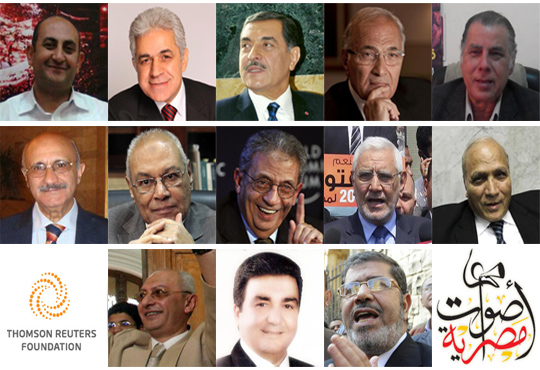Egypt vote monitors say state hindering their work

Foreign observers of Egypt's first real leadership contest will be unable to say whether the process is free and fair because their movements are being restricted by election authorities, one of the groups supposed to be monitoring the vote said.
The election to decide who succeeds ousted President Hosni Mubarak after more than a year of interim army rule begins in a week, but international observers have not received the documents they need to be witnesses, said Sanne van den Bergh,field office director at the U.S.-based Carter Center.
"Even three weeks ago would be quite late. Normally we witness candidate nominations, voter registration, certainly the campaign period. We cannot comment on the entire process if we have missed those aspects," she told Reuters in an interview.
The process of choosing a head of state for the most populous Arab country will help define the success of street revolts that last year swept a region long ruled by monarchs and military strongmen.
With Egypt's interim army rulers pledging to hand power to the winner of the two-stage election, citizens accustomed to Mubarak's tightly-managed politics are now being courted through impassioned television debates and well-funded campaigns reaching deep into the provinces.
But the build-up has been marred by last-minute disqualifications of some leading candidates that fuelled suspicions among critics of the ruling generals of high-level manipulation.
Fewer international groups will be monitoring the vote compared to parliamentary elections, whose final stage in January was overshadowed by a judicial crackdown on several civil society groups accused of receiving illegal foreign funds.
Police raids on the groups, including some with close ties to the U.S. government such as the National Democratic Institute and International Republican Institute, led to a diplomatic stand-off between Egypt its long-time ally the United States.
The spat died down when Egyptian judges lifted a travel ban on several foreign pro-democracy campaigners, allowing them to leave the country and avoid trial and possible imprisonment, but the groups are still unable to work in the country.
The Carter Center, founded by former U.S. President Jimmy Carter with a broad remit to promote peace, democracy and public health, was not targeted in the crackdown. Van den Bergh said it was one of only three foreign groups licenced to monitor the presidential vote.
The other two are the Electoral Institute for Sustainable Democracy in Africa and a network of Arab election monitors.
NO BADGES, NO STATEMENTS
The monitors are unable to do their job because a stateelection committee has still not issued the badges it requires observers to display when attending campaign rallies, doing research among voters or monitoring the actual vote.
The election committee, a new body independent of the judiciary and parliament, has taken greater control over the monitoring process than its precedessor which managed the parliamentary vote, the Carter Center said.
It has also toughened rules under which the monitors can operate, including banning them from making public statements until the results are announced, said van den Bergh. It was not clear if that meant the monitors must remain silent until June21 when the results of a run-off vote are due to be announced.
"In any election observer mission you give statements about things that can still be improved during the process. If you cannot comment until afterwards, it defeats the purpose," vanden Bergh said.
The restrictions contradict internationally agreed principles for election monitoring which Egypt's government has acknowledged at the United Nations, she added.
The Carter Center issued eight statements during the parliamentary election cycle from late November to January,which offered the first opportunity for foreign monitors to observe an Egyptian election.
Monitors reported scattered irregularities in that election,but nothing that changed the overall outcome - a sweeping win for Islamists who were repressed under Mubarak.
Egypt's ruling generals insist the presidential vote will be democratic, pointing to the parlamentary election as proof that the authorities can conduct a poll that is free and fair.
Van den Bergh said monitors were told they would not be allowed to spend more than half an hour in a polling station.
"We train our observers to be very careful and to talk to the judges overseeing the vote with respect. To have it written in black and white that you have to leave after 30 minutes is very disappointing," said van den Bergh.
"This is a combination of restrictions that we have never faced before. It means we cannot draw conclusions on the overall process."









facebook comments